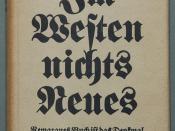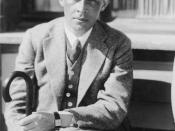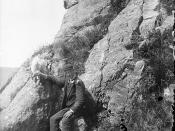Erich Maria Remarque's All Quiet On The Western Front is the testament of Paul BÃÂäumer, a young German boy who enlists in the German army with his classmates during World War I. Shortly after graduating from their school, Paul and his friends are filled with patriotism as they are recruited into the army. However, their youthful enthusiasm is soon shattered and their visions of the "glorious war" are soon swept away when they witness the death of their friends on the battlefield. Hardly twenty years old, the soldiers begin to gradually come to grips with the physical and mental horrors of war. Ultimately, Paul vows to resist the hatred that has caused the war to escalate between "men of the same generation, but of different uniforms" (Remarque)*. Delbert Mann's 1979 film, also called "All Quiet on the Western Front," is an accurate visual depiction of Remarque's novel; it closely follows the original plot.
Although slightly different in their depiction of World War I, both the Erich Maria Remarque and Mann renditions of All Quiet portray the progressive disillusionment of German soldiers through graphic imagery, character interaction, and irony.
The characters' discontent begins with the grueling days at basic training. The boys have just come out of school and enlisted in the German army during World War I. They fall under the command of Corporal Himmelstoss, a postman turned tyrannical drill instructor, who bullies the recruits from the day of their arrival. The hardships of basic training are amplified in both the novel and the movie by various encounters between the boys and the Corporal. When Himmelstoss makes the young comrades grovel in the mud, the boys start to lose their romantic vision of life in the military. In Mann's movie, Himmelstoss first begins to pick on Paul after Paul knocks him down at bayonet practice. That same night, Himmelstoss wakes him up just to step repeatedly on his foot. Remarque's version provides the reader with a scene of its own, which is not mentioned in the film. All Quiet depicts Himmelstoss humiliating Paul and his friend Tjaden for wetting their beds, and unmaking all the boys' beds just after they have been neatly made. Such actions stir fury among the soldiers, who use every available opportunity to have their vengeance on the Corporal. They begin to evolve into men who are able to stand up for themselves and are unwilling to tolerate Himmelstoss' abuse.
After spending three weeks in basic training, the boys embark on their journey to the front. As they make their way to the train station, the train on which they are to go to war is first unloaded. In the film, hundreds of doctors and nurses scramble everywhere, aiding the wounded soldiers who are returning from the front, while Paul's group stands nearby. The boys get uneasy as they observe that the men being carried out are clad in bloody bandages. Some of them have had their legs amputated, and others have various broken limbs. The book also describes the same scene, although it is the soldiers themselves who are helping the nurses tend to the wounded. The imagery presented in the text and through the camera haunts the young soldiers as they realize the dreadful reality that lies ahead at the front. The horrors of war are reinforced when the boys are in the trenches during the French bombing raids. The boys are scared of being confined in a trench with corpses lying around. The corpses attract rats and the rodents often overflow the trenches. In the Mann version, hundreds of rats rush through the trenches and eat away at the dead bodies, while the book seems to have a less graphic approach and does not mention such details. In both instances, however, the soldiers are disgusted by the sight and have to defend themselves and their rations from rodents and infectious diseases.
Paul's emotional connection with the audience helps him to speak for his comrades when he loses his last illusion of war. When a French soldier jumps into a bomb crater in which Paul has been hiding, Paul's first reaction is to stab the man. As the Frenchman lies in the crater, Paul stares at him throughout the night. He thinks about the men that he has killed before with grenades or guns, and about how they had all been far away when they died. The Frenchman is Paul's first victim in hand-to-hand combat and when Paul sees the soldier's blood on his hands, he curls into a ball in shame. He begins to feel the inhumanity of war and goes through a nervous breakdown as he realizes the futility of what both sides are fighting for. Watching a man die not more than a foot in front of him is shocking to Paul; he feels insecure about what to do, and eventually tries to help the soldier, but it is too late. When the soldier dies, Paul makes his way toward the body and takes out an envelope containing the Frenchman's personal information. He finds out that the soldier's name is Gerard Duval, looks at some family pictures, and begins to feel like he has killed a comrade. He is thrown into denial and curses himself for killing the man; it becomes clear to him that "if we threw away these rifles and this uniform you could be my brother just like Kat and Albert" (Remarque 223). Although Gerard dies despite Paul's attempts to save his life, Paul asks him for forgiveness and decides to write to his family and apologize for his death. Only then does he see how effectively Europe has brainwashed its young generation into fighting.
The soldiers' disenchantment continues when they are stationed in the military hospital after they have been wounded in a bombing attempt on the trenches. As patients in the hospital, Paul and his companions see the casualties caused by the war and experience them as victims, along with others who share the same pain. Paul is somewhat frightened at first when he sees the aftermath of the major attacks that were considered victories by the Germans. These "victories," as the soldiers were told, did not result in many deaths, when actually the number of German casualties was twice as great as that of all of the Allies. The greatest trend observed throughout both All Quiet and its film counterpart is that the characters introduced to the audience perish one by one as the story progresses. In fact, by the time Paul writes his last letter to classmate Albert Kropp, "of the 20 boys who enlisted, thirteen are dead, four are missing, and one is in a mad house" (Mann). Soon afterward, Albert becomes the sole survivor of the group.
Another aspect of All Quiet that Remarque emphasizes to portray the disillusionment of the characters during the war is the way they interact with each other. This is evident when the new recruits are first introduced to Corporal Himmelstoss in basic training. Tensions start to build up between the soldiers and Himmelstoss and the boys become frustrated with him. The way they are treated as recruits in the German Army soon changes their preconceived notions of glory and they begin to see that fighting in the war is not an easy task. The boys begin to lose hope further when they visit their friend, Franz Kemmerich, in the military hospital. They find that Franz has been drugged to let the doctors continue with the amputation of his leg. Once the doctors clear away, the boys have a chance to talk with Kemmerich, who has been injured in the trenches. To their dismay, nobody can bear to tell Franz that the wounds on his leg are incurable and that the surgeons have had to amputate it. The boys try to cheer him up by telling him jokes. The next day, the soldiers return to visit Franz and find him lying dead on his bed. Paul and his friends begin to lose hope in the war; they fear that they, too, will end up like Franz. The transition of Paul BÃÂäumer from a schoolboy to a veteran becomes very apparent when he visits his mother during his sick leave from the front. When he arrives home and greets his sister and parents, he realizes that there is nothing he can say to his mother, who is dying of cancer. "We say very little and I am thankful that she asks nothing," he recalls (Remarque 159). The fact that he is unable to have a straightforward conversation with his family shows that Paul has become distant from his family and disheartened by his experiences in the war. When he visits the mother of Franz Kemmerich, who was the first of Paul's friends to die in the war, he lies to her about Franz's death (Remarque 181). Even after Frau Kemmerich's demands for the truth, Paul insists that Franz felt no pain when he died. To test him, Franz's mother makes Paul swear by ""ÃÂeverything that is sacred'" to him (Remarque 181). Paul complies without much hesitation, and this decision serves as an indication that Paul no longer holds anything sacred. He seems to have lost respect for the things he left behind and considers the front his "real home" (Mann). The horrendous world that exists in the trenches is now the only world that Paul really knows.
Through the use of graphic imagery and character interaction, Erich Maria Remarque and Delbert Mann present to their audience the steady decline of the enthusiasm of the German boys, their transformation from innocent recruits to hardened veterans, and their gradual adjustment to their new home""the front. The story of Paul BÃÂäumer reflects an entire generation of men whose lives are changed forever during the course of World War I (Remarque), mainly because of what the world becomes through their eyes. Millions of other young men who have the potential to lead successful careers are forced to give their lives in a four-year stalemate under the flag of nationalistic glory. As they watch the dead and injured while suffering through the miserable conditions on the frontlines and losing touch of their loved ones back home, it dawns on the German soldiers that the preaching of the government are worth nothing in battle. Even while fighting, they already know that the endless trench warfare will not benefit either side. Unable to resist the war effort, Paul and his comrades can do little else but continue to fight.
*All citations reading "(Remarque)" are from the back of the book jacket; therefore, they contain no page number





